#she let herself be human and feel things and prioritise people over duty and that's all that matters to her even if everyone she loves
Text
The Not-So-Amazing Mary Jane Part 16: MJ is being extremely selfish
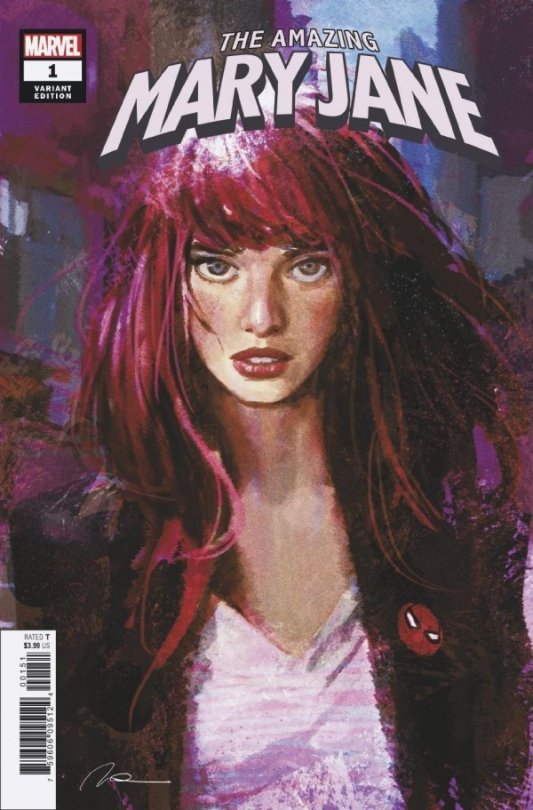
Previous Part
Next Part
Master Post
Last time I pointed out how its a false equivalency to claim being Spider-Man’s lover is no more dangerous than working with Mysterio.
This time out I will detail how MJ is, at least arguably, being extremely selfish in AMJ #1. Specifically, selfish in regards to her career. To explain how and why though we’re going to have to delve into MJ’s life priorities, in particular how she views her marriage to Peter.
There are various scenes in AMJ #1 that at least imply she is:
Leveraging her silence to improve her character’s role in Mysterio’s movie
Impressed/excited to be working on the movie
Hoping the film will serve her future career prospects well; possibly by opening up the possibility of a spin-off for her character.
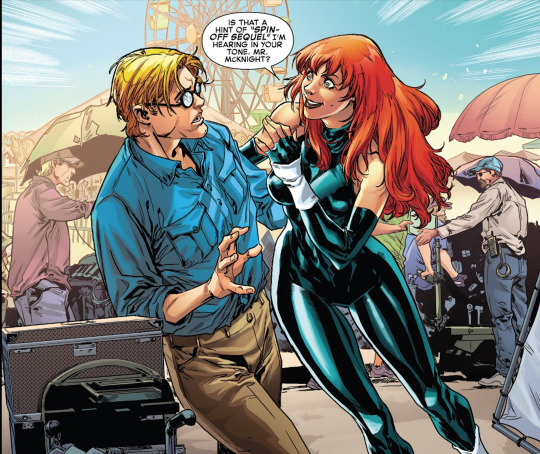
When taken in context of the story it can come across as though MJ’s sincere enthusiasm for making the films, and her hopes It will aid her career, are factors in her keeping quiet about Mysterio.
That in addition to any hypothetical sympathy she might possess for Beck/his crew, any hopes they could use his opportunity to reform (or at least contribute something positive to the world), she is also thinking about herself.*
On the other hand that might not be the intent by Williams, Gomez. Or it might not be how the story pans out.
But for the sake of argument let’s pretend it is. In that case then it would be yet another (perhaps the worst) example of mischaracterization in the entire story.
Let me spell it out for you plainly.
Mary Jane would NEVER prioritise her career prospects over the potential safety and well being of innocent people.
Never.
I’d have thought that was obvious but apparently it’s yet another thing that needs to be proven with evidence. Thankfully I have just such evidence.
The first and most obvious reason for why this is utterly out of character for MJ links back to something I mentioned earlier. Specifically in part 9.
We know MJ understands and puts into practice Peter’s underlying life lesson, that she herself tries to live by it in her own way. Peter, pretty much from the day his uncle died, has strived to be selfless in general, in particular in regards to his hero duties. Indeed it is this selflessness that so often strained his romantic relationships, which included his one with MJ.
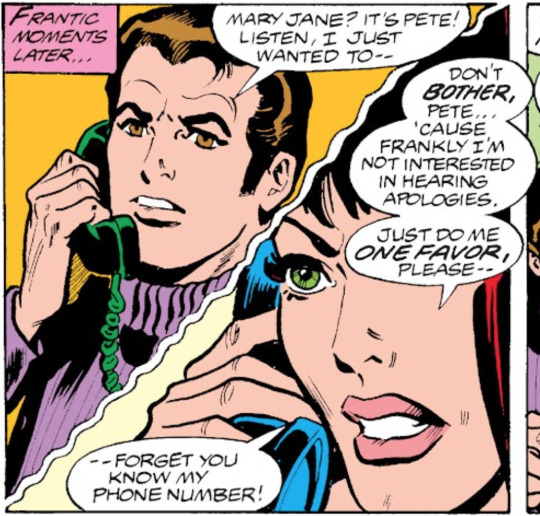
It is therefore not believable that for her own financial or career interests MJ would be so lenient with criminals or allow them to operate essentially freely with no accountability. At best this is still fairly similar to what Peter did in Amazing Fantasy #15.
One might argue that MJ just values her career thatmuch. That she has had such struggle so hard to make it work in the past that this opportunity is something she doesn’t want to let slip by.
This then calls into question just how much MJ values her career in the grand scheme of things, so let’s take yet another dive into history lesson to examine that.
In ASM #303 Peter was offered a great new job, the catch being that it was in Kansas. This would not only entail moving to that state but also MJ potentially giving up her beloved modelling career. MJ was forced to question what was more important to her, her career or her marriage.
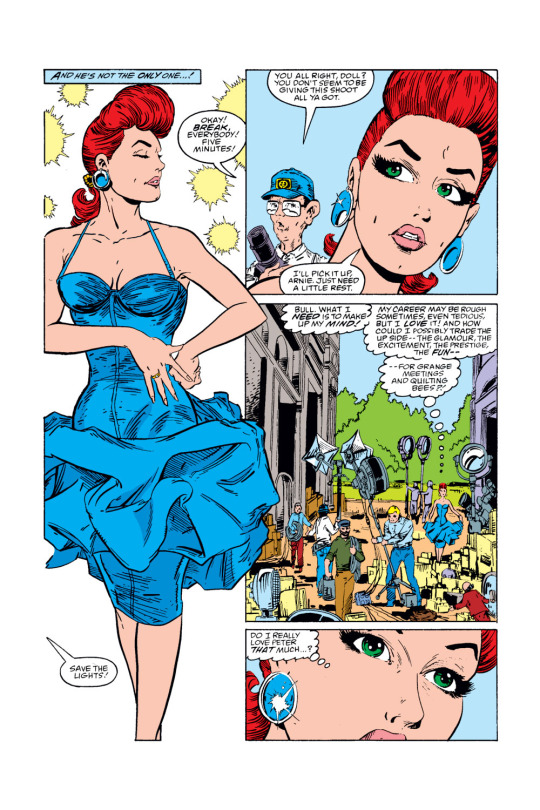
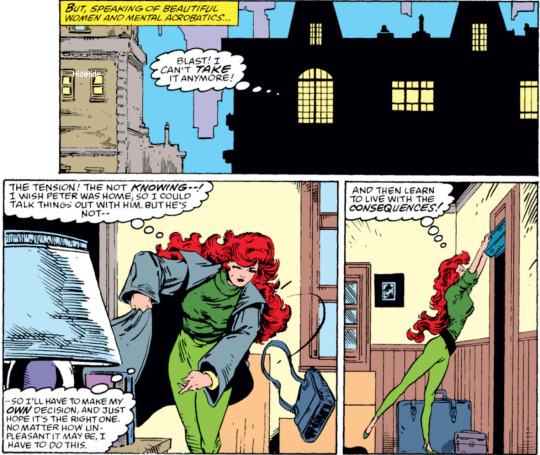
Ultimately she decided it was her marriage, though thankfully Peter opted to turn the job down for her sake.
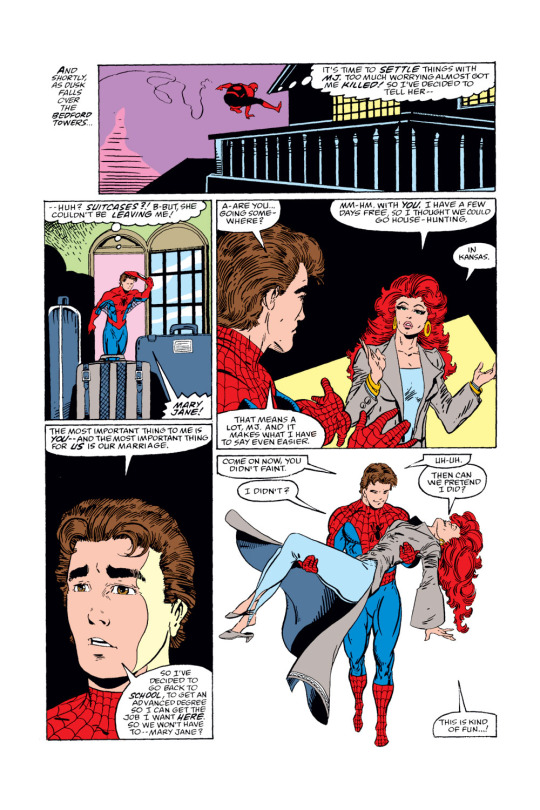
Another example can be found in ASM #502, which transpires not too long after Peter and MJ have gotten back together following a separation. Immediately following their reconciliation MJ took a break from her fledging acting career, having just starred in a super hero movie, Lobster Man. She did this in order to move back to NYC and work things out with Peter. In this issue though she raises the topic of returning to work (which would involve spending a lot of time in L.A.) but qualifies she won’t if it would risk harming their relationship.

More recent stories maintain this characterization, such as ASM v5 #29 which actually leads directly into AMJ. In the issue MJ clearly wants to take up the role in Mysterio’s movie offered to her. But she is also torn because it would entail leaving Peter for a long while. Peter, aware of her feelings, reluctantly encourages her to go. It is heavily implied this encouragement is at least an important factor in MJ’s decision to pursue the role, but even then she raises the idea of changing her mind.

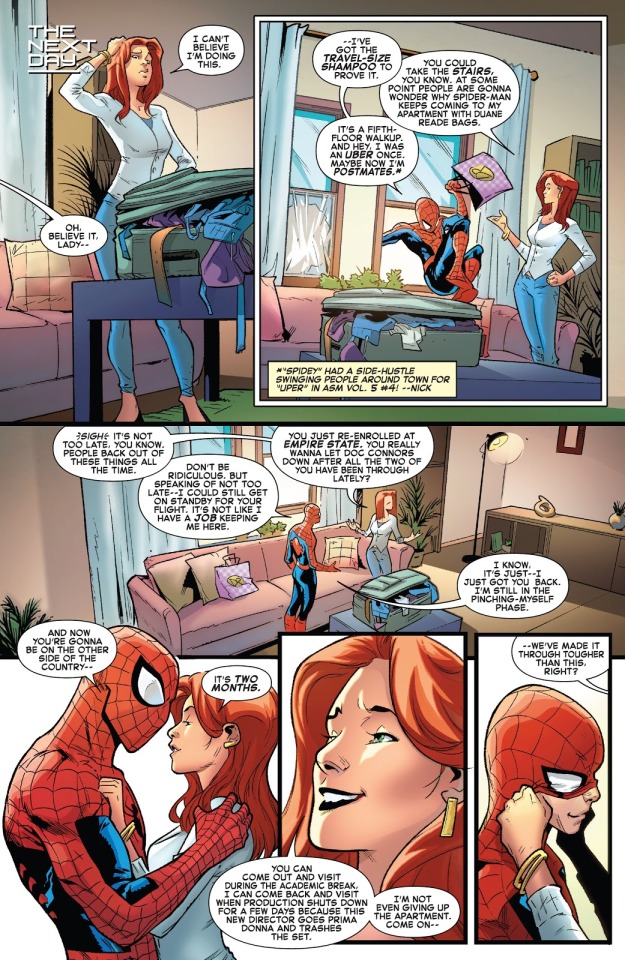
To jump back in time a little, Sensational Spider-Man v2 #32 provides us with our final example of how MJ values her relationship with Peter over her own career.
In the issue MJ is dealing with the ramifications of Peter unmasking to the world and consequently (along with MJ and Aunt May) going on the run when the Super Human Registration Act was enforced.
Pushed to her wits end and wrestling with her life falling apart MJ is frustrated by her loss of status and career. However, by the issue’s end she’s come to terms with her new status and reaffirmed her commitment to her husband.


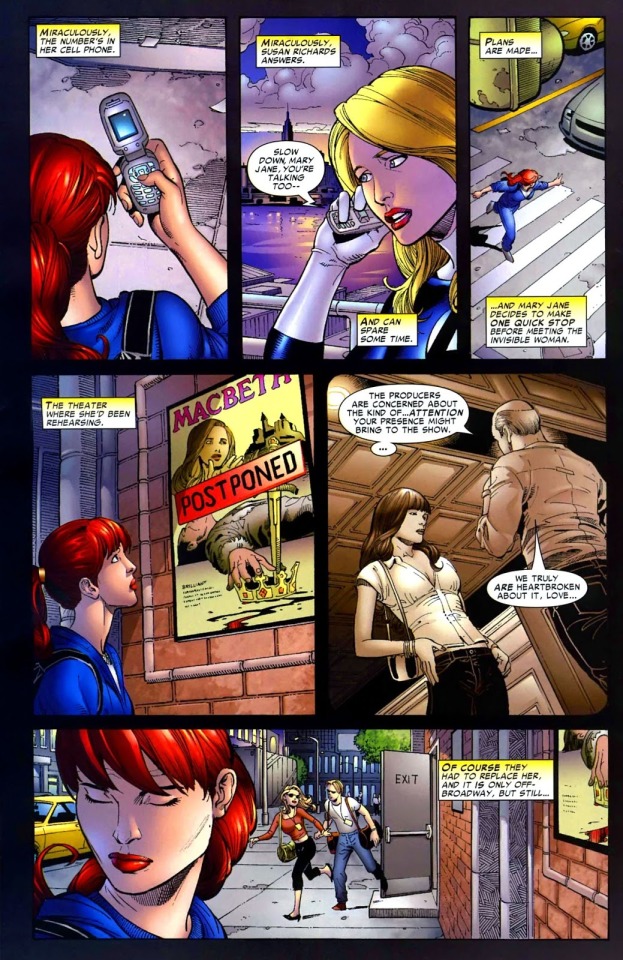

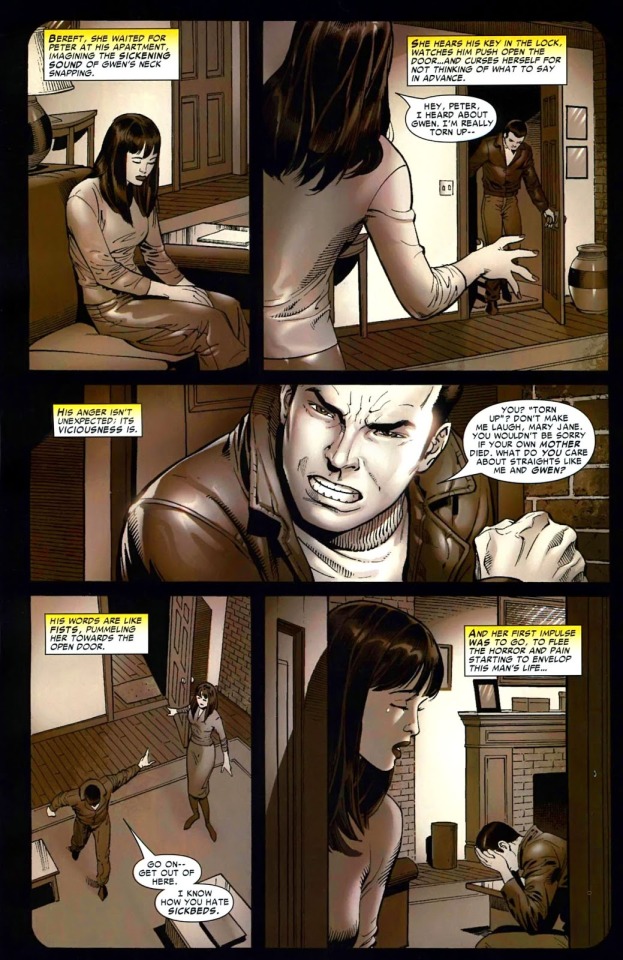
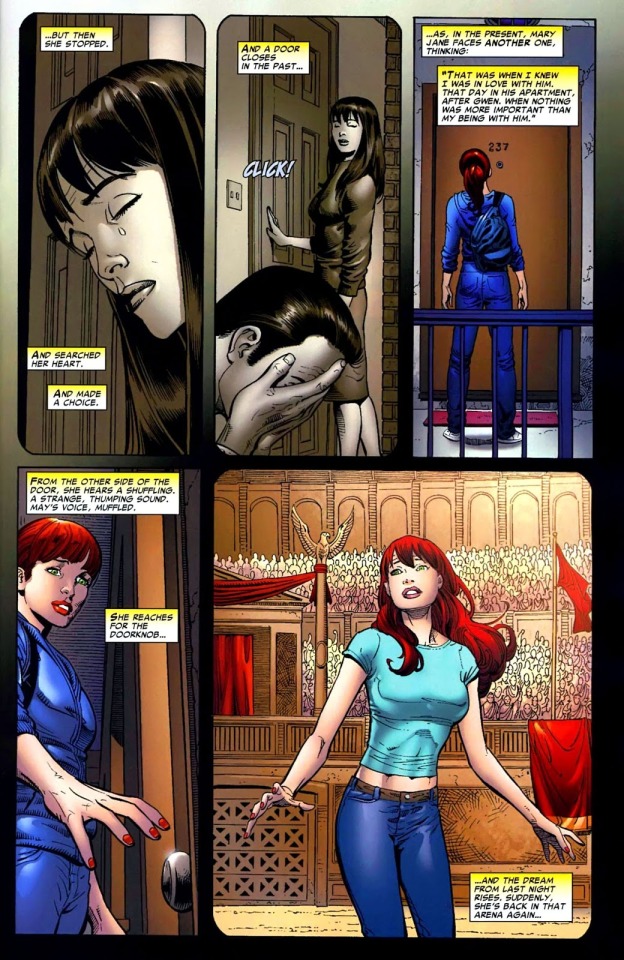
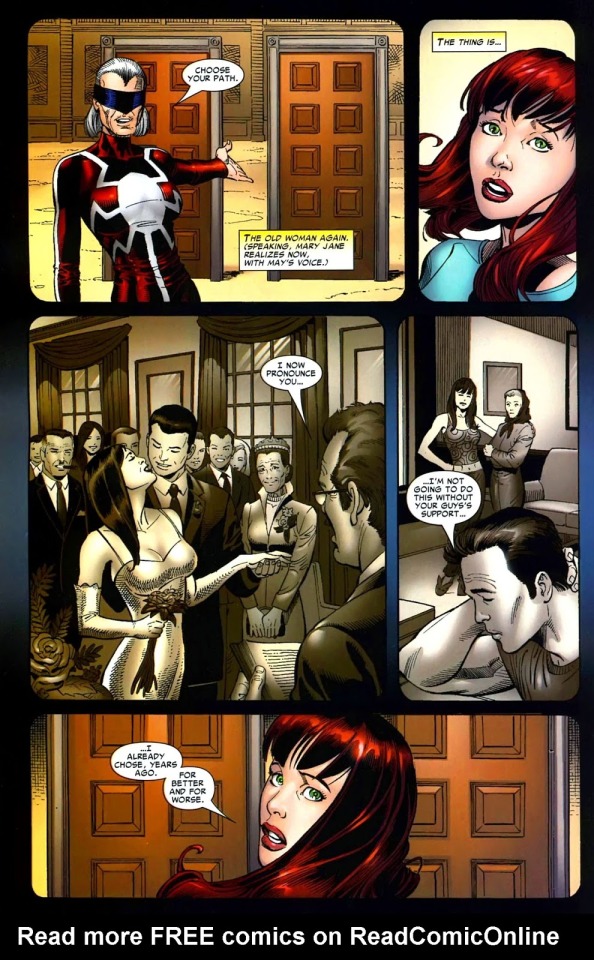
For sure, these are not a 1:1 equivalent to the situation under discussion. In AMJ we’re talking about MJ’s career vs. her sense of justice and in the above examples the question is between her career vs. her marriage.
It’d be fairly easy to argue that obviously MJ values her marriage more than her career, as Peter himself does too. Surely most people in healthy relationships have similar priorities?
But by the same token wouldn’t common sense dictate that if MJ was willing to give up her career for the sake of a relationship she’d also be willing to give it up for something that, in the grand scheme of things, is actually much more important; namely people’s lives?
After all, Peter may well give up his heroic duties for the health of his loved ones, but he wouldn’t do it simply to retain a relationship with them. This is evidenced in ‘Maximum Carnage’ when Peter reluctantly goes against MJ’s wishes of taking a break due to Carnage attacking the city, a fact MJ ultimately accepted.
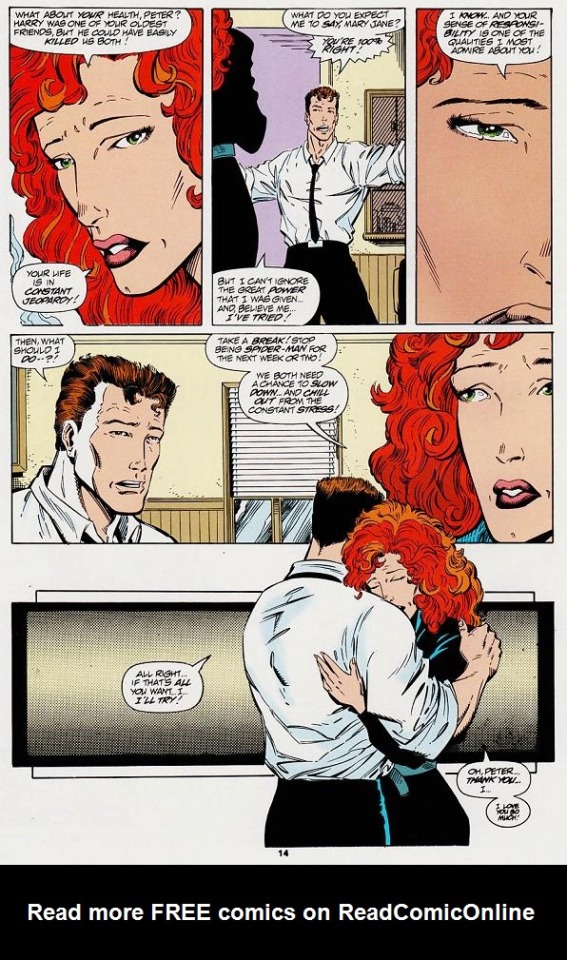

This shows us that, as hard as it can be for Mary Jane, she believes in the need for Spider-Man in the world (to protect the innocent and apprehend crooks) and places the importance for that over her relationship with him.
She might not like it, but she recognizes the greater good.
This sentiment is further corroborated in ASM v2 #50, wherein MJ and Peter try to patch up their marriage. In the conversation MJ outright states that she never wanted nor expected Peter to place her above his duties, and that she never wanted to interfere with them.***

MJ’s recognition that her and Peter’s relationship is ultimately trumped by Peter’s heroic duties is glimpsed again in ASM v5 #29.
MJ hopes Peter will accompany her to the airport before she departs for L.A. but Spidey stuff gets in the way. Whilst she admits him letting her down again upset her she also calmly acknowledges that his work was more important because he is saving the world/innocent lives.

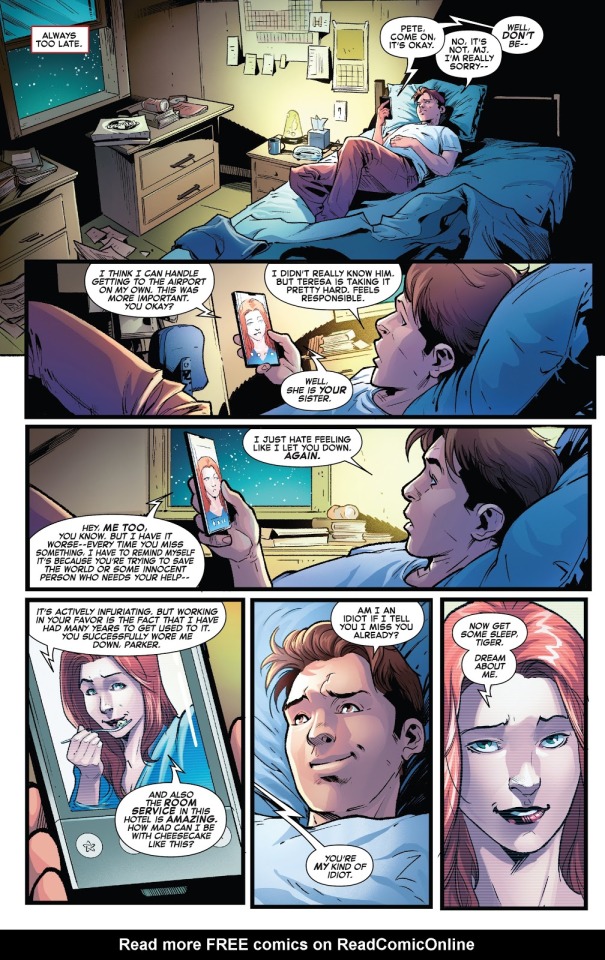
What I’m saying is if MJ ultimately prioritizes Peter’s duties (and thus the well being of innocent people) over keeping her marriage in tact and also values keeping her marriage in tact over her career then obviously she prioritizes innocent lives over her career.
Or to put it more succinctly, MJ’s priorities read like this:
Innocent lives>Her marriage>Her career.
Additionally in Spider-Man Unlimited v3 #2 Mary Jane simply states outright that she values Spidey’s heroic duties as more important than her career.
In the story MJ ponders how it is ridiculous for her to be treated like royalty for being an actress whilst a hero like Spidey gets nothing.
She even denigrates her job in comparison to the importance his role as a hero is. Finally she voices upset about feeling useless in the face of what he does. Her upset is alleviated when Peter informs her that she is an important factor in enabling him to be a hero in the first place.



The story very clearly outlines that MJ places distinctly greater value on Peter’s role as a hero than her job in the entertainment industry.
It also arguably proves MJ on some level wants to contribute to Peter’s role as a protector of innocents and catcher of the guilty herself. In this regard it isn’t alone as some other stories arguably tap into that idea too.
In a part 9 I looked at how in Web Annual #6 MJ keenly participated in jury duty. This could be taken as evidence of MJ wanting to participate in the justice system as Peter (sort of) does. And if we return to ASM v2 #50 we can find a little more food for thought in the very moment Pete and MJ reconcile.
In the trade versions of the issue (which I admit brings the canonicity into question a bit) MJ reveals that the reason she separated from Peter was because she felt like she was unneeded in his life (as Spider-Man), that she wasn’t a part of it and that she couldn’t help.
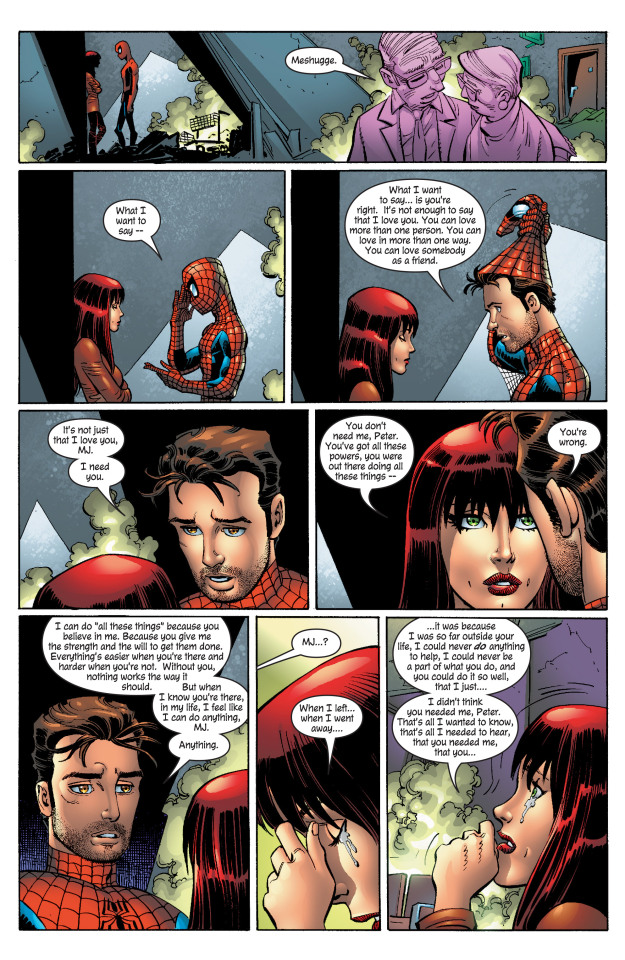
This could be taken as a further example of how MJ in fact wishes to contribute to Peter’s ‘mission’ as it were, though I admit that isn’t a watertight argument.
Furthermore let’s consider a particular moment from AMJ #1 itself. As you might recall, MJ noticed the presence of super powered people and criminals on the film set along with her as well as how the director (Cage McKnight) was avoiding her.
This was in spite of writing the role for her, hiring her without an audition and insisting she be in the movie. MJ was suspicious and confronted McKnight demanding to know what kind of con he was pulling. Although he insisted it wasn’t a set up, his inability to provide any answers led to MJ quitting.
She stated she wasn’t an innocent, naïve, unsophisticated young actress who could be scammed with empty promises and promptly began to walk away.
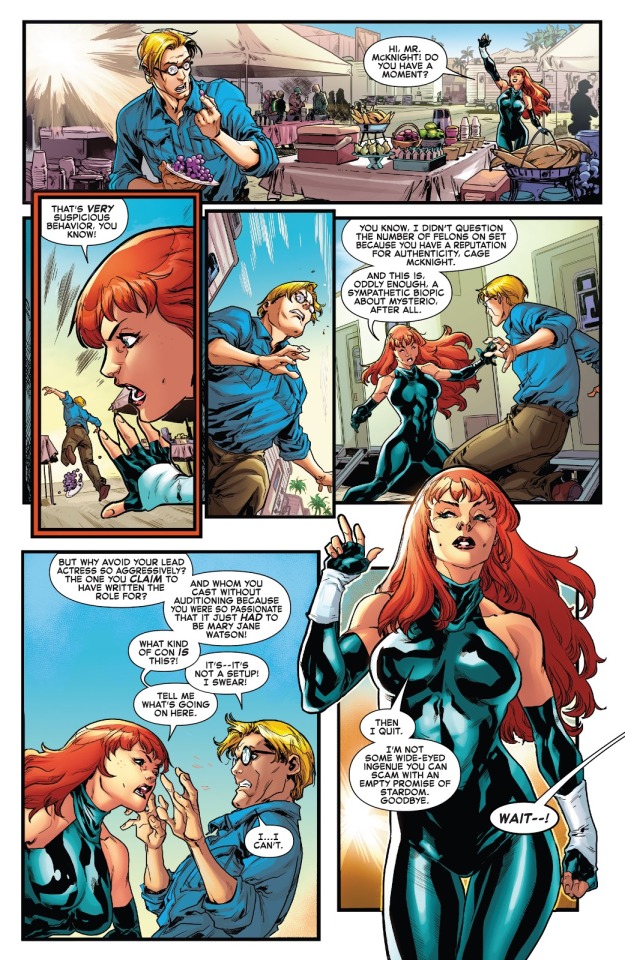
Whilst it’s possible to argue that MJ was simply bluffing in order to know the truth, the likelihood is she seriously intended to leave.
Consider the fact that she has acknowledged the presence of criminals, the director literally running away from her and the questionable circumstances behind her hiring. Specifically she claims to have come to the conclusion that the film is not legitimate.
Do these preceding events really imply that MJ was merely bluffing? Unlikely, she can clearly tell something smells fishy and she’s at the centre of it somehow. Realistically, common sense would dictate not sticking around for the sake of your career, especially if you’ve concluded there isn’t actually a career opportunity to be had in the first place.
Mary Jane doesn’t know the specifics of the con. For all she knows she could be caught up in general crime, some kind technically legal Hollywood scam, a sinister plot connected to Spider-Man (which would technically be correct), yet another obsessed stalker or some kind of #MeToo moment waiting to happen.
Regardless, she was prepared to walk and potentially throw away any career opportunity she might have by sticking around.
If she was prepared to do that with the limited information she had then when she learns of the actual situation why would she stick around?
Now, you could argue that MJ is concerned for the careers and livelihoods of the crewmembers who are not criminals. But even this doesn’t stand up to scrutiny because that’s the equivalent of caring about the people unknowingly employed by a crime lord. If the crime lord goes down they lose their jobs. That sucks, that’s horrible. But their jobs are obviously far less important than the potential lives and livelihoods of other innocent people Beck might harm.
Yes it’s a choice between lesser evils but it’s a necessary choice, and one the police make regularly. People can find new jobs, but lives are irreplaceable after all.
There is some food for thought supporting this too, gleamed from Spider-Man’s own actions.
In a story from Spider-Man Unlimited #11 a poor criminal (named Joe) with a wife and baby is apprehended by Spider-Man. He desperately begs Spidey to let him go for his family’s sake. Though Spidey takes in Joe’s words and is implied to believe him, he ultimately doesn’t agree. Harsh as it might be, he simply tells Joe he should have thought about his family before he broke the law.


At the issue’s end Peter is arguably upset by the experience, and yet he clearly didn’t change how he operated.
Later, in the Clone Saga, Ben Reilly was shocked to learn that his new lover, Jessica Carradine, was in fact the daughter of Uncle Ben’s killer. He learned that as a result of her father being caught by Spider-Man Jessica had a hard life growing up in foster homes. Peter and MJ were fully aware of the situation with Jessica and helped Ben work through his feelings.
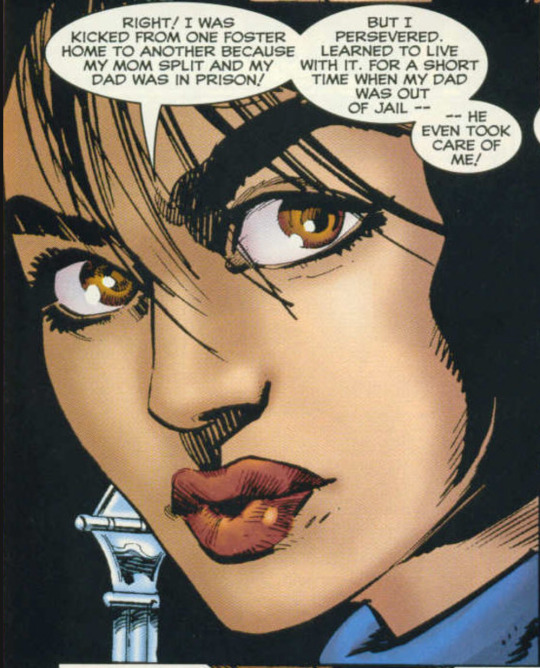
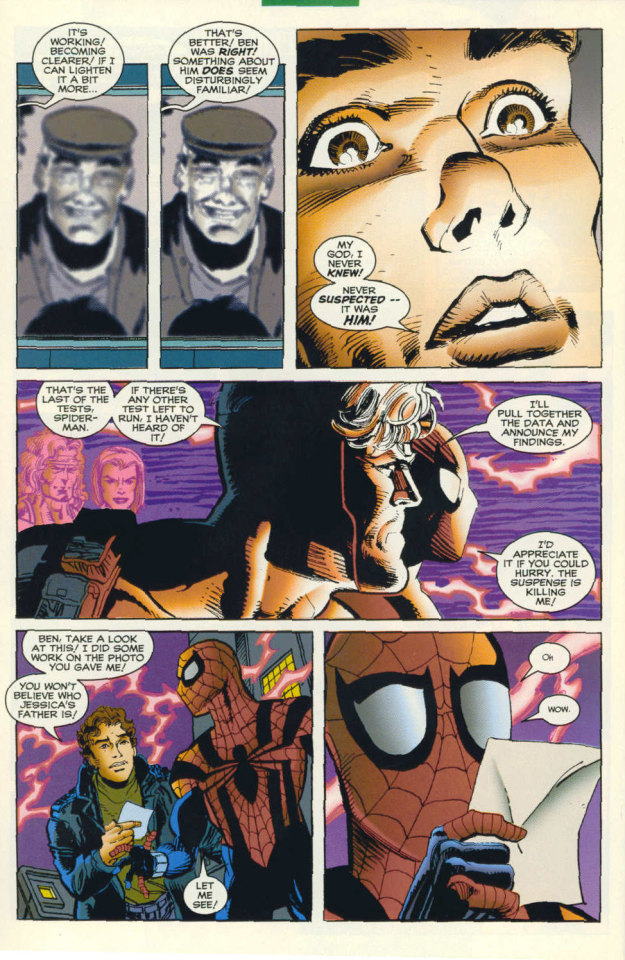


It is important to note that at this time Ben, Peter and MJ all believed Ben was the original Peter Parker, the actual person bitten by the radioactive spider. This meant that as far as they knew Ben was the one who personally apprehended Jessica’s father.
In spite of this information though neither Peter nor Ben ever even considered changing how they operated as Spider-Man, nor did MJ ever suggest they do so in light of Jessica’s experiences
Finally in ASM v2 #55-56 Peter discovers that Melissa (a student he was teaching) was the younger sister of a criminal he apprehended named Joshua. Joshua’s capture had a negative effect upon the rest of his family. This included him keeping his distance after being released from jail. Peter learned that Joshua was hanging out with other reformed criminals under the eye of Ezekiel Sims, a friend of his who knew his identity. Ezekiel basically called Peter out for not checking in on the criminals he captured, nor their families.




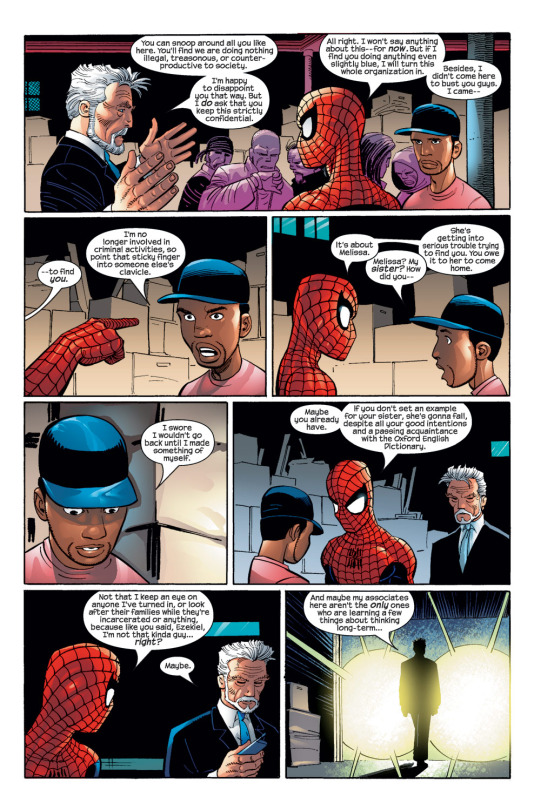
Though Peter claimed this was an impossible task, by the story’s end he did at least consider trying to attempt the feat. He also informed MJ about this incredibly unique experience even in amidst his incredibly unique life, meaning it’s something she’d be likely to remember.
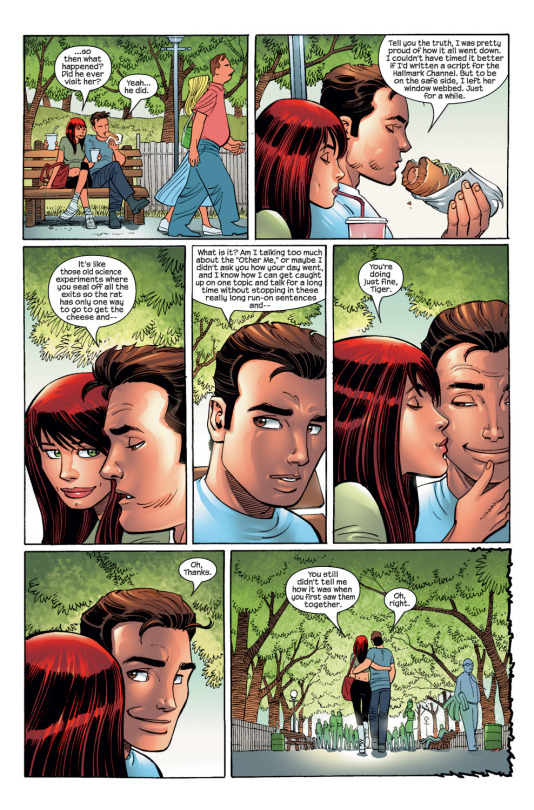
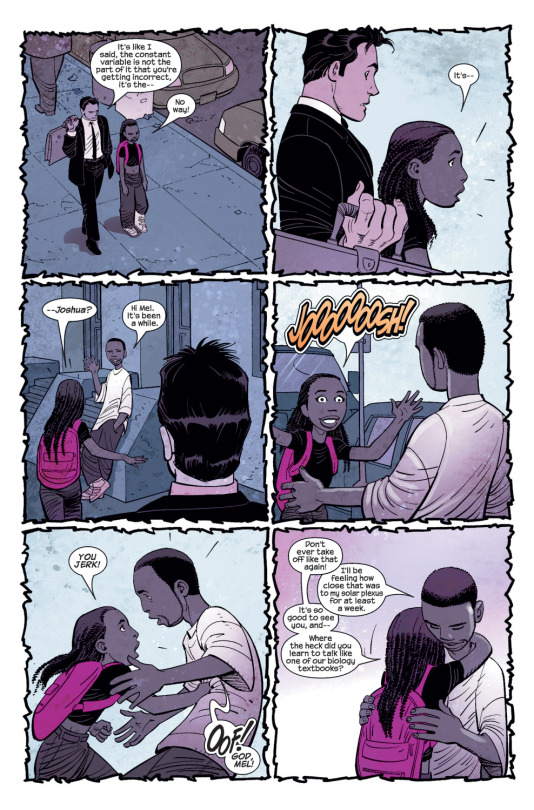
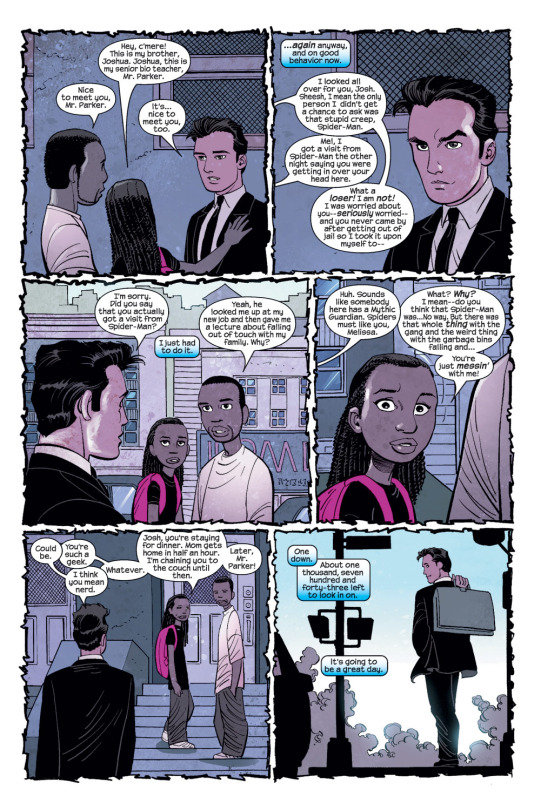
Noticeably though neither in the story nor thereafter, did Peter ever consider not bringing criminals in out of concern for the unintended consequences. In fact, upon learning the truth about Joshua’s group he still made it clear that if they did anything even slightly out of line he’d turn in the organization.
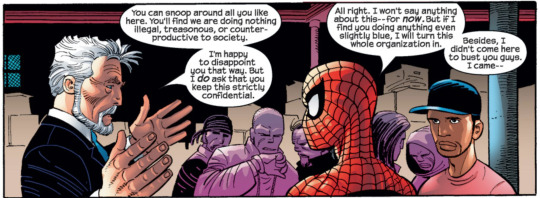
It’s clear from these examples that Peter believes that criminals are worth capturing even if there might be negatives consequences upon their families. It’s something he doesn’t like but his sense of justice places the greater good upon the innocent people who are or might be harmed by the criminals above the families more indirectly affected by the criminals going to prison. Logically the extension of this mentality is that Spider-Man prioritises preventing crime and apprehending criminals over the jobs that might be affected by their capture, because a family seeing one of their own sent to jail and struggling with their loss is obviously not as bad as simply losing your own job.
Once again I will remind you that MJ’s own sense of justice is extremely similar to Peter’s and in fact directly influenced by it. Thus it is very possible that MJ shares this sense of priorities.
But I will admit how much MJ is aware of these incidents and how much she directly applies them to herself can be debated. Nevertheless it’s at least something to consider. Even if you feel these examples are not really applicable to MJ, just real life common sense would dictate that you shouldn’t let dangerous criminals walk free just because you are costing (merely potentially) innocent people their current jobs. Even if they were blacklisted from Hollywood MJ could at least put in a word for them with her acquaintance, billionaire Tony Stark, who might be able to find them other work.
Moving on, next time we’re going to examine the fact that in AMJ Mary Jane is knowingly deceiving Peter.
*Note that they are contributing something important to the world through deceiving investors and using the identity and reputation of someone who hasn’t consented to any of that.
**It is worth bearing in mind that between Ben Reilly being Spider-Man at this time and MJ being heavily pregnant, her desire for him to remain retired was entirely sympathetic.
***Before anyone brings it up, yes, strictly speaking this is not true. Maximum Carnage alone seemingly contradicts this sentiment. But it’s fairly easy to argue that MJ’s dialogue here is speaking specifically about their marriage (not their pre-martial relationship) and excluding extenuating circumstances. Circumstances such as the immediate aftermath of Harry’s ‘death’, MJ’s pregnancy, and Peter being seriously injured. Alternatively it’s entirely possible to argue that MJ is speaking about how she feels deep down at the end of the day, not how she might’ve felt during off days where she was occasionally less understanding than others.
After all Peter himself deep down is dedicated to being Spider-Man but he has quit or contemplated quitting multiple times.
Previous Part
Next Part
Master Post
#Leah Williams#mjwatsonedit#mary jane watson#Mary Jane Watson Parker#MJ Watson#Amazing Mary Jane#Mysterio#Spider-Man#Peter Parker#quentin beck
18 notes
·
View notes
Text
On the character writing of Captain Marvel’s antagonists
How is Captain Marvel’s villain game?
The MCU’s story of how Carol Danvers comes to realise what gives her the capacity to do heroic things is rooted in an intimate tale of self-discovery, knowing oneself, and embracing oneself as one is. It is not a classic story of confrontation between good and evil and therefore the classic hero’s journey formula does not apply. Carol is exactly the same personality at the end of the film as she is at the beginning of the film, with the crucial difference that by the end, she is in a position to control and honestly evaluate her own life narrative – she has regained solid ground under her feet without which no one can pass moral judgments or make decisions that affect the lives of other people.
Carol’s origin story is not about punching someone into remorse and submission, but about finding herself (almost literally) – which means that the antagonists of the film are the friends she makes along the way. The opposing force is a deeply personal one and climbs into the protagonist’s soul rather than threatens their life. That makes Yon-Rogg not as one-dimensional as people seem to think. He’s more of a foil than an outright antagonist to Carol on a personal level, but it’s hard to say whether he is overall meant to be represented as a misguided Kree patriot or a hammy villain because the former gets too vague a development and the latter just does not work – war is war, they’re all dirty, and Supreme Intelligence takes the cake here. Since Yon-Rogg’s motivations are strongly informed by his role as the poster boy of the Kree military, the Kree-Skrull plotline actually should be elaborated upon if they wanted to convey him as “the guilty party” in both storylines that push the story forward.
I’ve tried to identify with the villains of the film in order to write the following; consider that it is not a pleasant exercise but an intriguing one nonetheless.
Storylines
There are two storylines that intersect in the film and push the plot onwards: Carol’s unfolding quest to make sense of her past, and the Kree-Skrull war. The twist in Carol’s personal storyline results in a change up in regard to how to view the Kree-Skrull war, but it’s not ground-breakingly illuminating, since the war between these races is never sufficiently elaborated upon and it is not the main emotional centre of the film – how Carol feels about the Kree and her mentor is! Therefore, the antagonists’ character development unfolds in layers.
Consider for a minute, the Kree ideology. Collectivist, imperialist, hyper-militaristic, superior in technology and culture. Roman Empire seems like an appropriate comparison. They see themselves as the rightful rulers by conquest who have a duty to maintain order, safety, and stability within their empire. Realpolitiks of empires. Hyper-militaristic inclinations translate onto the individual level as well where the collective interest is set before one’s individual interests. And it translates into Yon-Rogg’s motivations and outlook very clearly, though with some interesting exceptions that add to his character writing.
· He is a devout warrior, unshakably loyal to the Kree’s cause and their claims of superiority.
Yet he is not fond of the scorched earth tactics of the overly zealous Accusers.
He avoids entangling civilians in the Kree-Skrull conflict to the very last second (he also avoids shooting Carol outright in their very first meeting).
He genuinely cares about his soldiers’ lives, and they trust him a lot in return, even when he is misleading other high-ranking officers in the Kree army (Ronan).
He prioritises the good of all Kree above all else (instead of, notably, personal power).
He genuinely believes in what he is trying to teach Vers (emotions should not rule your good judgment in a conflict situation; the Kree’s enlightened rule is for the better for all); it is not only part of their cover-up scheme.
He views the Skrulls’ means of fighting as dishonourable because of their penchant for subterfuge rather than direct combat. In another context that would be called being “honourable” in combat.
So, as a Kree, an authoritarian space fascist, he is pretty reasonable and a more rounded than your standard evil for evil’s sake goon.
What to make of him in relation to Carol?
It’s twisted from its very beginning, since Yon-Rogg effectively saves Carol’s life by stealing it from her. He hesitates to kill Carol outright by the lake. Then, ironically, saves her life by abducting her as she verges between life and death. And then, metaphorically, the Kree kill Carol Danvers anyway. Only to “bring her back to life” through the blood transfusion from Yon-Rogg and through the presumed genetic meddling to make it stick (her entire blood supply and blood reproduction has to get replaced). A “rebirth” with no memory of past life, but with cosmic powers and superior physiology to contain it. It’s as messy as they come.
That bit of writing also establishes how unnervingly intimate a bond they share (something that comes to underlie a sense of possessiveness and ownership on his part, and confirms that this is not healthy). To see Carol succeed strokes Yon-Rogg’s ego – he made the right call as a soldier, he is part of the origins of her powers, and he is a good teacher. It also makes you think, was it (stupid) curiosity, principles, or admiration that stopped him from shooting Carol? She had almost brought him down in a plane fight, after all. And while he acts under orders from SI, I doubt Yon-Rogg protests its wisdom too much – it is highly likely the Kree see themselves as genuinely benevolent for saving this human and giving her so much by making her one of them (see their sense of superiority, again). If anything, I would expect an AI (not Yon-Rogg) not to want to risk leaving Carol alive and liable to turn against them.
It is said in interviews that Yon-Rogg both appreciates and is irritated by Carol’s “humanity” and quirks. He also seems to me as perfectly aware that what he is doing is wrong on a personal level. Over six years, he and Carol grow close – he is her crutch in Kree culture, Carol trusts him a lot (coming to him after her nightmares) and looks up to him/wants to prove herself to him, and there is even some implicit flirtation between them at the beginning of the film (“it’s me you see, isn’t it?”). That level of friendship entails some empathy. He may be ruthless, but he is not a psychopath (or is only a psychopath to the extent all devout patriotic soldiers are). For despite all that happens to Carol, she is not aware of any of it, and she ends up liking her life with the Kree by the time the film starts. She has military background, she likes to prove herself and be good at things, and the Kree never treat her badly (minus the grand deception part, ofc). From Yon-Rogg’s perspective then, as long as the lie is not found out, it is not objectively a bad life, is it? He has a soft spot for his favourite student (their relationship has been described as “tender” among other things). He has faith in her (“She’s stronger than you think!”), is (over-)protective of her, but wants to genuinely see her succeed - albeit on the Kree’s terms and not her own. He is trying to do his best as a mentor to a soldier and as a soldier to his people, and sincerely believes it will make everything easier for Carol, but because of the manner in which Carol has come to be his pupil, all of what is happening here can only become one huge poisoned chalice. However, you can see how someone like him can justify lying to a person for 6 years - longer still, had Carol not happened to crash on C53.
The truth of the matter is, of course, that Carol due to her amnesia does not have a choice regarding the narrative into which she is thrust, and that is the inherent evil that she overcomes in the film – taking back control over her life’s narrative and thus also gaining the necessary faith in oneself that comes with knowing oneself. The Kree have given her plenty, making up a big part of her (literally), but by infringing on her right to self-determination most horribly in the process. “The best version she could be” can ever only be pushed upon her in this state, like it happens so often in overly controlling families and partnerships.
Consider seriously that while Yon-Rogg’s advice to “control emotions and not let them cloud your judgment” may echo the belittling gender dynamics of our world, it is only an analogy – the Kree are not putting Carol in this situation in the film because she is a woman (they’re arguably rather progressive about their gender and sexual politics by the looks of it). It is not inherently a wrong or bad advice to drill into a soldier, and that is what Carol is – a soldier. However, as it happens, autobiographical long term memory triggers most strongly based on emotions, so suppressing them also counteracts the possibility that Carol might regain her memories. The Kree may well not even know what Carol could do if she was more in touch with herself and her powers – their foremost concern is winning “her heart and mind” so that she doesn’t turn against them. Again, they are personal, psychological villains. So, by tying her more strongly to Kree culture and ways, as well as training her according to that dictum, Yon-Rogg’s hitting two birds with one stone, really. I do not doubt that his orders from SI were, and his mind is set on, ensuring her loyalty by any means necessary. However, in comparison to, for instance, Bucky, the Kree do not literally constantly torture and brainwash her to turn her into a vegetable. It’s a “golden cage” type situation from the perspective of these “benevolent” aliens.
In that sense, the ‘enemy’ of the film is not so much the meme of a “debate me guy” or your ordinary our world chauvinist, or patriarchy (they are analogies, but not inherent to the conflict of the film), but the insidious disregard the Kree show toward individuals and their right to self-determination. As a culture, that is not their thing. And as other cultures are seen as lesser than them, they see their ways as backwards. Arguably that disregard underlies and precedes gendered readings because it applies universally (would they have done anything differently if Carol had been a man? I don’t think so) (also, it underlies the war ideology behind subjugating other races). And war justifies everything, of course, which is the second strongest ‘evil’ motif in the film. That’s pretty good, layered writing, in truth.
Both ‘evils’ are represented in Yon-Rogg’s and Supreme Intelligence’s characterisations, but only the latter remains abstract enough to be the literal representation of it whereas Yon-Rogg is still written with some “humanity” for the lack of a better word. He is very much conveyed as a product of his society, but not even a one-dimensional caricature of that. Sure, we do not get any insight into his inner thoughts, but not once did the details I have written out here give me the impression that Carol is as upset as she is because of betrayal by a lump of evil with no moving parts inside. I can appreciate that in an antagonistic force, because it adds to the hero’s internal confusion if their starting out premise is “friends with my enemy”. There is extreme pragmatism more than there is cruelty in the villain’s intentions. But cruelty follows anyway, because freedom and predetermination cannot not be in conflict, and very rarely does cruelty not follow when ends justify the means quite as brutally as in the case of sacrificing someone’s freedoms for another’s greater cause.
For Yon-Rogg that is not an issue, though he himself is as deprived of freedom under this ideology as Carol is. But Carol’s moral system hails from a different place.
I can relate to it and find it interesting, and not at all one-dimensional. Best of all, it is possible to build upon it.
#captain marvel#carol danvers#yon-rogg#supreme intelligence#kree#character analysis#plot analysis#story deconstruction#brie larson#jude law
202 notes
·
View notes